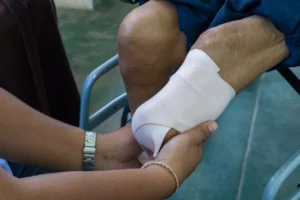 An amputation can lead to a long and painful recovery process. If someone else’s negligence caused you to lose a body part, you should not have to pay for their carelessness.
An amputation can lead to a long and painful recovery process. If someone else’s negligence caused you to lose a body part, you should not have to pay for their carelessness.
A personal injury lawyer can explain your legal rights and options during a free consultation.
Continue reading to learn about amputation injuries, how they happen, and how to recover compensation for their effects.
What Is an Amputation?

An amputation is the full or partial loss of a body part, typically a finger, toe, arm, or leg. This piece will focus solely on traumatic amputations, which occur as a result of an accident or injury.
Amputation can refer to an injury that occurs as a direct result of an accident, such as a leg being severed during a traumatic car accident. Or, it can refer to the surgical procedure of removing a body part due to extensive injury.
Why Is an Amputation Necessary?
An amputation may be necessary due to the injury itself or due to complications that arise after seeking medical treatment for your accident-related injury.
Common reasons when amputation is necessary include the following:
- There is severe trauma to your limb, such as a crushing injury
- Your limb has become deformed and has limited movement and/or function
- Your limb is severely infected
- Your limb has been affected by gangrene
There may be other reasons for amputations. However, medical professionals are unlikely to recommend this route unless it is the best option remaining.
What Types of Accidents Can Cause Amputations?
Many times, amputations are the result of incidents involving someone’s negligence, such as:
- Car accidents, including those involving fire or explosions
- Truck accidents that involve large commercial vehicles that crush smaller passenger vehicles
- Motorcycle accidents that result in severe road rash or cause deforming injuries
- Workplace injuries caused by defective or dangerous machinery, falls from unprotected heights, and exposure to dangerous toxins
Some amputations are caused by intentional or reckless conduct, including the misuse of firearms, explosives, or fireworks.
How Are Amputations Treated?
The loss of a limb often occurs with medical intervention after it has been severely injured but is too damaged to be saved. In such cases, surgery is often required. The accident victim will go under general anesthesia while the surgeon removes damaged tissue around the injured body part. The surgeon also seals off blood vessels. In some cases, the detached body part can be reattached. In others, the patient can receive a prosthetic.
After the amputation, the wound may be sealed with stitches or surgical staples. It may be covered with a bandage, and a tube may be inserted under the patient’s skin to drain excess fluid. The patient will usually be hospitalized for several days following an amputation for monitoring and to check for signs of infection. The patient could also experience excessive bleeding or shock.
The patient’s long-term outcome depends on the early emergency care they received. They may receive physical therapy to help them adjust to their prosthetic or to regain some motion and mobility.
However, amputations can result in serious complications, including infection, heart attack, slow wound healing, phantom limb pain, pneumonia, and deep vein thrombosis. Therefore, it is essential that amputees closely monitor their health in the months and years following amputation.
What Type of Compensation Can You Recover After an Amputation Injury?
If another person caused an accident that resulted in your amputation, you may be able to pursue compensation for the full extent of the losses you’ve suffered.
The party responsible for your injuries and damages may be:
- A negligent driver
- A medical professional
- An irresponsible property owner
- An employer
- Another negligent party
An experienced personal injury lawyer can meet with you and determine the damages that might be available for your claim.
Common losses associated with amputation injuries include:
Medical Expenses
Medical expenses associated with amputations can be exorbitant. One study found that out-of-pocket medical expenses within the first two years of an amputation averaged more than $90,000. The lifetime care costs exceeded $500,000.
Medical expenses for amputation injuries may include:
- Emergency medical treatment and transport
- Hospitalization
- Prosthetics
- Physical therapy
- Follow-up care
- Specialist visits
- Pain management
Unfortunately, medical expenses are only one part of the economic damages you can expect to incur after an amputation injury.
Lost Income
An amputation injury may leave you out of work for several months. However, many amputees are unable to return to work and suffer permanent disabilities. You can seek compensation for the short- and long-term losses of your income.
Pain and Suffering
Real pain and phantom pain are likely to follow amputees for years after their injuries.
Decreased Quality of Life
Your pain can also decrease your overall quality of life.
Other factors that can negatively affect your quality of life after an amputation injury include:
- Depression, anger, stress, and mental health problems stemming from the trauma of the event and your ongoing disability
- Personal, romantic, and social relationships that are negatively impacted by your injuries and disability
- A shortened life expectancy and potential medical complications that can arise because of your injuries
- A loss of a sense of identity as you become more dependent on others and may lose your career
You should be fairly compensated for the full effect the injury has had on your life, including the deterioration in the quality of your life.
Other Out-of-Pocket Expenses
There are many other expenses that you may encounter as you adjust to your new normal.
Injury-related expenses may include:
- Wheelchairs, crutches, and other medical devices
- Home renovations to fit your home for a wheelchair
- Renovations to make your vehicle wheelchair-accessible
- Travel expenses and mileage for your medical appointments
- Over-the-counter supplies for stump care
- In-home attendant care
- Replacement services for transportation, housekeeping, and other duties you can no longer perform
A knowledgeable personal injury lawyer can give you a better idea about the potential compensation you may be able to recover.
Contact an Austin Personal Injury Lawyer for Help Pursuing Compensation for an Amputation Injury
The consequences of an amputation injury can be far-reaching, resulting in lifelong complications. If another party caused your trauma, you can hold them accountable by filing a civil lawsuit against them. Contact an Austin personal injury attorney from FVF Law or call (512) 982-9328 for assistance.